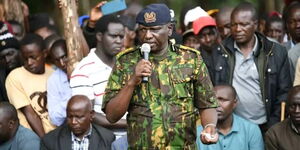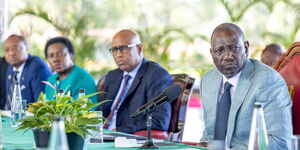Democratic Action Party-Kenya (DAP-K) leader Eugene Wamalwa has claimed that the government is using artificial intelligence (AI) to discredit the opposition.
Speaking at Donholm Primary School in Nairobi on Wednesday, February 26, Wamalwa alleged that AI was being used to generate fake letters and photos depicting Wiper leader Kalonzo Musyoka in Mombasa and suggesting that he intended to join the government.
"AI is now being used as a tool of propaganda. The other day, Gen Z put some people in coffins, and now those people are using AI to discredit the opposition," he said.
"There is a photo I have shown Kalonzo Musyoka that appears to show him in Mombasa with Ruto. There is also a letter, allegedly from Wiper, inviting the media to a press conference at Tamarind Hotel, claiming that since Ruto has taken away half of the government, Kalonzo is now in Mombasa preparing to join him," he added.
Wamalwa, however, reaffirmed that the opposition will remain steadfast in blocking unfavourable policies and pushing for President William Ruto's removal in the 2027 general election, despite resistance from the government.
Furthermore, he assured that Kalonzo and himself would not align with or join the government but would instead continue to rally their support behind the people.
"They can buy every party, and that is Ruto’s target—to weaken all political parties so that there is no opposition when he increases taxes. I want to assure you that even if they buy all political parties, they cannot buy Wiper and DAP-Kenya," he said.
In recent months, artificial intelligence has sparked controversy in the country’s political arena, with individuals on both sides—supporting and opposing the government—admitting to using it.
Wamalwa's sentiments come barely a week after the Foreign Affairs Principal Secretary Korir Sing'oei apologised for sharing an AI-generated video depicting CNN Journalist Journalist Fareed Zakaria commending the Kenyan government for stepping up in the ongoing Sudan conflict.
The PS was, however, forced to address the matter after the controversial video attracted widespread attention from Kenyans online, who criticised him for sharing the deepfake.
In a statement on February 21, the PS expressed regret for sharing the AI-generated video and apologised for any confusion the footage may have caused.
"I sincerely apologise for inadvertently posting an AI-generated video disguised as a genuine commentary from Fareed Zakaria of CNN on the search for peace in the Sudan conflict and Kenya’s role in it," the PS stated.
"I regret any confusion this may have caused and thank everyone who flagged the video as a deepfake," Korir added.
According to Korir, the Ministry of Foreign Affairs has been working with partners and technology companies to explore the potential of watermarking AI-generated content to ensure such material is not mistaken for human-generated content.
Last year several X users were allegedly abducted for sharing offensive AI-generated images of the President.












